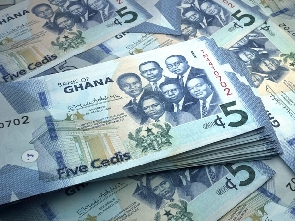 File photo of Ghana cedis notes
File photo of Ghana cedis notes
The Institute of Economic Affairs (IEA) has proposed a significant increase in the amount of foreign exchange cover for currency issued by the Bank of Ghana. The IEA has recommended that this increase should be enshrined in law, as part of reforms to the constitution, with a view to safeguarding the economy.
Currently, the Bank of Ghana Act 2002, Act 612, allows for up to 60 percent of currency in circulation to be covered by cedi-denominated Treasury instruments, with the remaining 40 percent covered by foreign exchange. The IEA argues that this is insufficient, and that currency which is fully covered by foreign exchange is considered more stable and less prone to fluctuations in value.
Speaking during a recent instalment of the IEA Constitutional Review Series, which had as its theme ‘Institutionalising Fiscal Discipline and Macroeconomic Stability For Sustained Growth In Ghana: The Constitutional Pathway’, its Director of Research Dr. John Kwakye pointed to the comparative stability witnessed among peers where the currency is 100 percent covered by foreign exchange. This means the monetary authority that issued the currency has enough foreign currency reserves to back up every unit of the domestic currency in circulation.
He clarified that the IEA is not calling for a sudden or strict rise in currency cover, but rather a staggered increase.
“The central bank provides significant lending to government and covers the cedi with limited foreign exchange, which is 40 percent in the Act. No wonder we face perennial instability. There is a provision in the Act that says the currency which the central bank issues must be covered with at least 40 percent of foreign exchange; well, at any point in time we should be able to check where we are. We argue that the 40 percent floor is not enough. In areas with Currency Boards, it is 100 percent,” he explained.
“We are not saying that we should move from 40 percent to 90 percent overnight, but we should be looking to raise the level,” the former Monetary Policy Committee member added.
Analysts have argued that a currency that is fully covered by foreign exchange is considered to be more stable and less prone to fluctuations in value, as there is a tangible asset that can be used to maintain the currency’s value. It can also help to instil confidence in the currency and economy as a whole – which can be particularly important for emerging market economies or countries with less established financial systems.
In recent months, the central bank came under much scrutiny for its financing of the budget deficit which stood at over GH¢44.5billion – around 64 percent of the previous year’s revenue versus the GH¢3.5billion that would have been in line with the law. The apex bank has on various occasions defended its actions, saying it could not allow the economy to collapse at a time the fiscal authorities were struggling with revenue generation and capital market access.
“We grant that the Bank acted to save the economy from possible collapse, but it must also recognise that the price to pay for that is high inflation and rapid currency depreciation. The worrying part is that, as we speak, we are not aware that the minister has made any report to parliament. And, surprisingly, parliament has also kept mute about it,” the economist added.
To forestall similar occurrences, the public policy think-tank proposed strict enforcement of the BoG lending ceiling, with a target of 3 percent in the medium-term – in line with the convergence criteria for the Economic Community of West African States (ECOWAS) and the West African Monetary Zone (WAMZ), which Ghana is a member of both – as well as a 60 percent Debt to Gross Domestic Product threshold.
Parliament
The IEA also recommended the establishment of an independent Fiscal Council or Parliamentary Budget Office to help parliament carry out its fiscal oversight mandate.
Dr. John Kwakye explained that the proposed council would be similar to those found in many other countries, such as the Congressional Budget Office in the US and the Office of Budget Responsibility in the UK.
“Our recommendation prompted formation of the Fiscal Policy Advisory Council by President Akufo-Addo in 2018. However, the FPAC did not meet our requirements to the extent that it was an advisory body attached to, and under the influence of, the president and working in secrecy – contrary to our call for an independent body attached to parliament and working transparently, which is the international standard,” he stated.
Dr. Kwakye emphasised that the IEA’s proposed Fiscal Council would be independent, attached to parliament and working transparently, which is the international standard.
“We want to table our proposal again for institutionalisation in the constitution, and we hope that this time it will be taken seriously. The establishment of an independent Fiscal Council or Parliamentary Budget Office is essential for ensuring fiscal discipline and macroeconomic stability, which are critical for sustained growth in Ghana,” he noted.